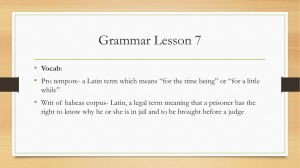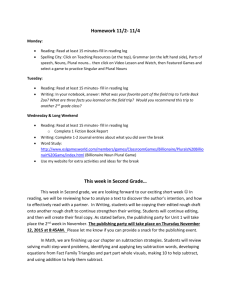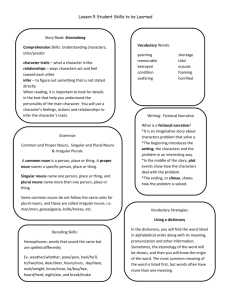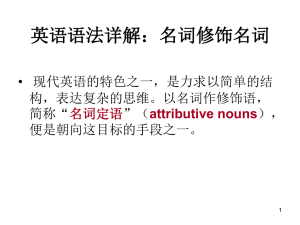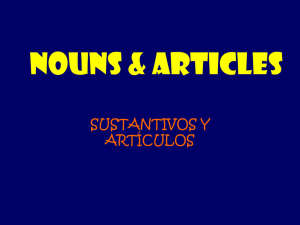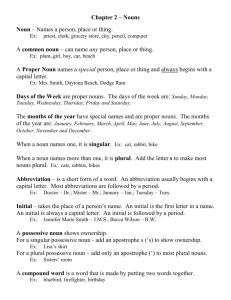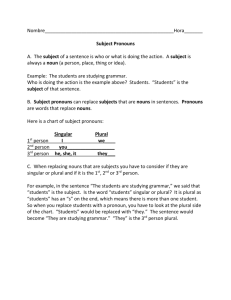Regular Plural Nouns
advertisement
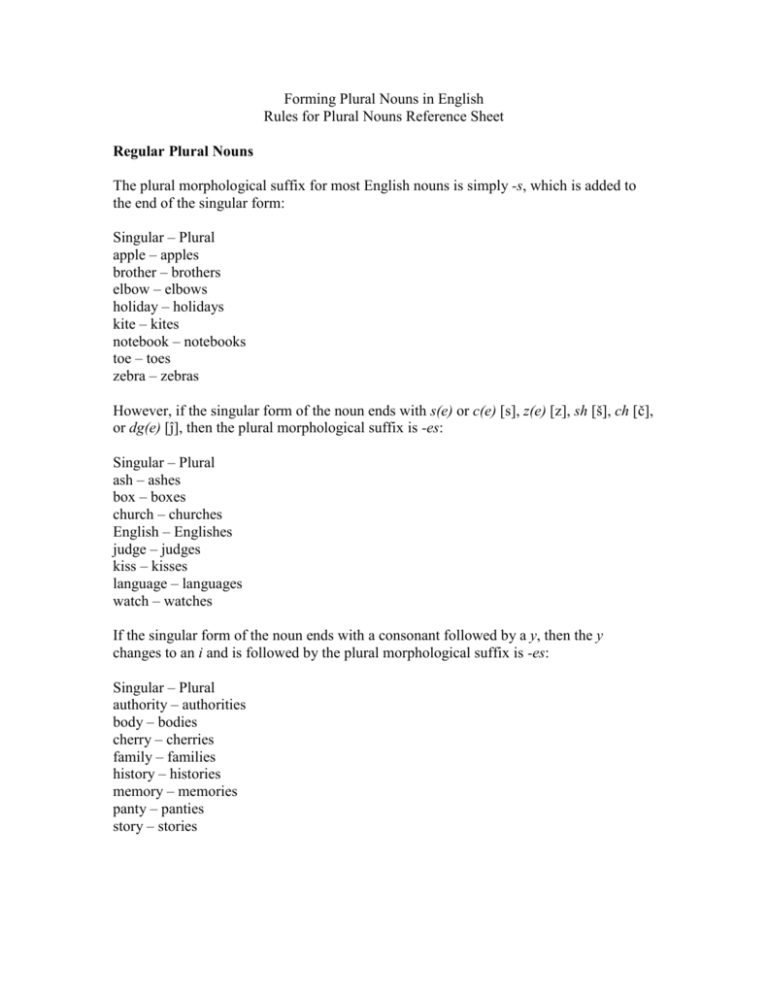
Forming Plural Nouns in English Rules for Plural Nouns Reference Sheet Regular Plural Nouns The plural morphological suffix for most English nouns is simply -s, which is added to the end of the singular form: Singular – Plural apple – apples brother – brothers elbow – elbows holiday – holidays kite – kites notebook – notebooks toe – toes zebra – zebras However, if the singular form of the noun ends with s(e) or c(e) [s], z(e) [z], sh [š], ch [č], or dg(e) [ĵ], then the plural morphological suffix is -es: Singular – Plural ash – ashes box – boxes church – churches English – Englishes judge – judges kiss – kisses language – languages watch – watches If the singular form of the noun ends with a consonant followed by a y, then the y changes to an i and is followed by the plural morphological suffix is -es: Singular – Plural authority – authorities body – bodies cherry – cherries family – families history – histories memory – memories panty – panties story – stories Rules for Plural Nouns Reference Sheet 2 If the singular form of the noun ends with f or fe, then the f or fe changes to a ve and is followed by the plural morphological suffix is -s: Singular – Plural calf – calves knife – knives leaf – leaves life – lives self – selves thief – thieves wife – wives wolf – wolves The f or fe to ve rule does not apply if the verb form of the noun ends in ve as in beliefbeliefs (noun) and believe-believes (verb). Nouns Ending in -o The plural morphological suffix for English nouns ending in -o is either -s or -es, which is added to the end of the singular form, depending on the specific noun. If the singular form of the noun ends with an o preceded by another vowel or vowel sound, then the plural morphological suffix is -s: Singular – Plural bamboo – bamboos cameo – cameos duo – duos embryo – embryos radio – radios scenario – scenarios stereo – stereos studio – studios If the singular form of the noun ends in o and the word is of foreign origin including most musical terms, then the plural morphological suffix is also -s: Singular – Plural alto – altos canto – cantos kimono – kimonos photo – photos piano – pianos rondo – rondos solo – solos taco – tacos Rules for Plural Nouns Reference Sheet 3 If the singular form of the noun ends with an o preceded by a consonant, then the plural morphological suffix is -es: Singular – Plural domino – dominoes echo – echoes embargo – embargoes hero – heroes mosquito – mosquitoes potato – potatoes tomato – tomatoes veto – vetoes For some nouns ending in an o preceded by a consonant, however, the plural morphological suffix is either -s or -es: Singular – Plural avocado – avocados/avocadoes buffalo – buffalos/buffaloes desperado – desperados/desperadoes ghetto – ghettos/ghettoes halo – halos/haloes hobo – hobos/hoboes portico – porticos/porticoes tornado – tornados/tornadoes The current trend for spelling the plurals of nouns ending in o preceded by a consonant seems to be moving in the direction of adding only the morphological suffix -s, particularly in the case of nouns with variable spellings. Irregular Plural English Nouns Unlike regular English nouns for which the plural morphological suffix is either -s or -es, irregular English nouns require vowel changes, consonant changes, or suffixation. For some common English nouns of Old English origin, the vowel undergoes an ablaut or vowel sound change: Singular – Plural foot – feet louse – lice man – men mouse – mice person – people (also consonant sound change) tooth – teeth woman – women Rules for Plural Nouns Reference Sheet 4 For some other common English nouns of Old English origin, the plural morphological suffix is -en or -n: Singular – Plural brother – brethren/brothers (archaic) child – children cow – kine/cows (archaic) eye – eyen/eyes (dialectal) ox – oxen hose – hosen/hoses (archaic) house – housen/houses (dialectal) shoe – shoon/shoes (dialectal) For other common English nouns often of Old English origin and referring to groups of animals, the plural form is identical to the singular form: Singular – Plural bison – bison deer – deer moose – moose offspring – offspring salmon – salmon sheep – sheep species – species trout – trout Irregular Plural Foreign Nouns Unlike the plural forms of nouns of English origin, the plurals of nouns borrowed as loanwords from foreign languages often conserve the plural form from the original language. If the noun is of Latin origin and ends in a, change the a to an ae: Singular – Plural alumna – alumnae formula – formula If the noun is of Latin origin and ends in ex or ix, change the ex or ix to ices: Singular – Plural index – indices matrix – matrices vertex – vertices Rules for Plural Nouns Reference Sheet 5 If the noun is of Latin origin and ends in is, change the is to an es: analysis – analyses axis – axes crisis – crises testis – testes thesis – theses If the noun is of Latin origin and ends in on, change the on to an a: automaton – automata criterion – criteria phenomenon – phenomena If the noun is of Latin origin and ends in um, change the um to an a: addendum – addenda datum – data medium – media memorandum – memoranda millennium – millennia If the noun is of Latin origin and ends in us, change the us to an i, era, ora, or es: alumnus – alumni cactus - cacti corpus – corpora census – censuses focus – foci fungus – fungi genus – genera radius – radii syllabus – syllabi uterus – uteri viscus – viscera If the noun is of Greek origin and ends in ma, add the suffix -ta to the end of the word: dogma – dogmata schema – schemata stigma – stigmata stoma – stomata Rules for Plural Nouns Reference Sheet 6 If the noun is of French origin and ends in eau, add a silent -x suffix to the end of the word: beau – beaux bureau – bureaux château – châteaux If the noun is of Hebrew origin, add the suffix -im or -ot to the end of the word: cherub – cherubim matzah – matzot seraph – seraphim Like with regular English nouns ending in o, the current trend for spelling the pronouncing the plurals of loanwords from foreign languages seems to be moving in the direction of adding only the morphological suffix -s, particularly in the case of uncommon or infrequent nouns.
